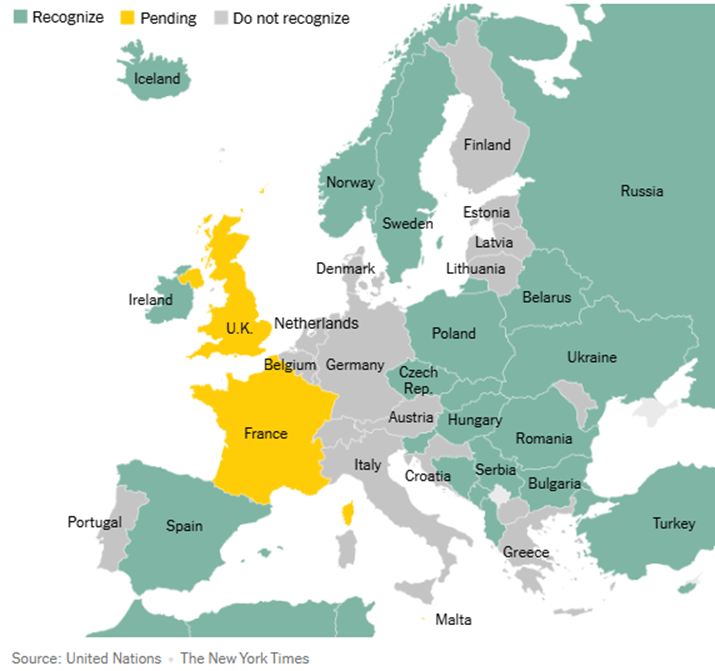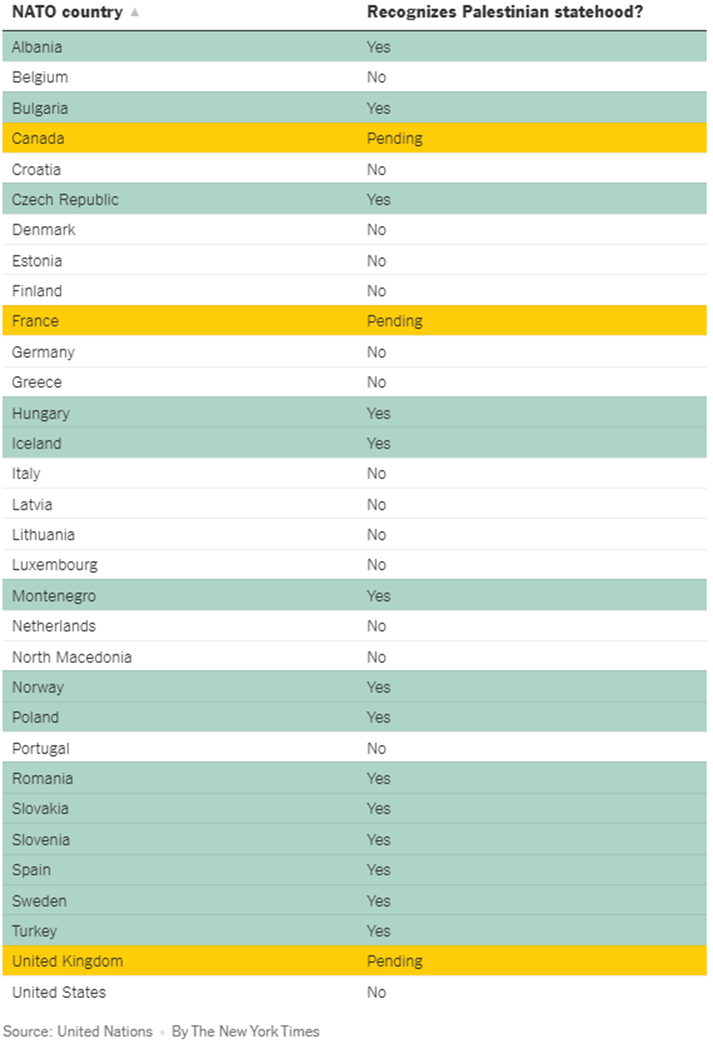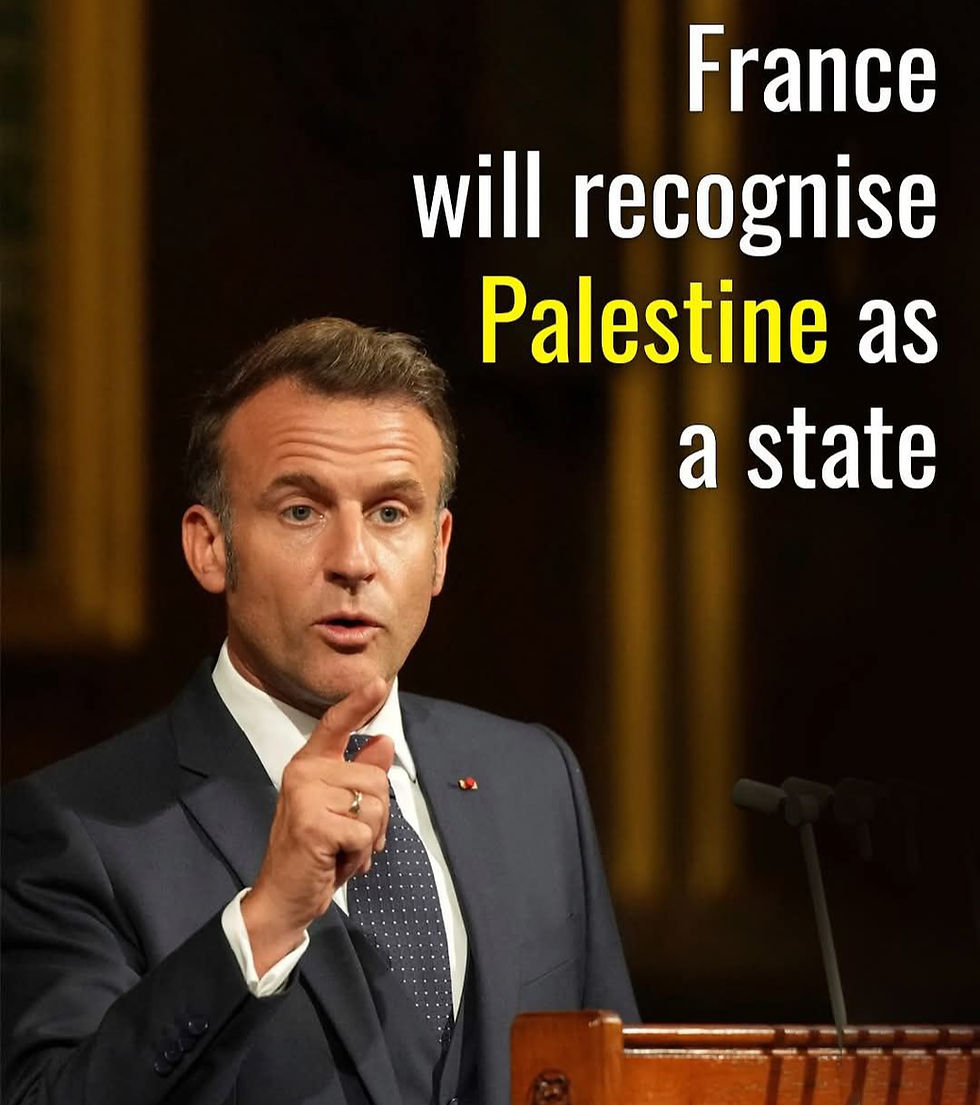Canada Joins France and UK in Recognizing Palestine: What It Means for Gaza and Global Diplomacy
- TPP

- Jul 31, 2025
- 5 min read
Updated: Sep 12, 2025
With over 150 countries already recognizing Palestine, Canada’s move signals a turning point in Western diplomacy — but not without conditions and political fallout.

In a major policy reversal, Canada announced it plans to recognize a Palestinian state during the United Nations General Assembly (UNGA) meeting in September, making it the third G7 country to do so in recent days, after France and the United Kingdom.
Prime Minister Mark Carney made it clear that Canada’s recognition would be conditional on a set of democratic reforms by the Palestinian Authority (PA). These include:
Holding national elections in 2026 — the first since 2006.
Excluding Hamas from participating in these elections or in any future Palestinian government. (Hamas is a Palestinian Islamist militant group designated as a terrorist organization by Canada, the U.S., and the EU.)
The demilitarization of the future Palestinian state. (Demilitarization means the state will not maintain its own army or armed militias.)
Carney said he received assurances from Palestinian President Mahmoud Abbas in a phone call that these changes would be implemented, paving the way for Canada's formal recognition of Palestine.
"The deepening suffering of civilians leaves no room for delaying coordinated international action to support peace, security and the dignity of human life," Carney said, following a cabinet meeting largely focused on the crisis in Gaza.

Background: Humanitarian Crisis and Rising Starvation in Gaza
The announcement comes amid worsening humanitarian conditions in Gaza, where tens of thousands of civilians have been killed in nearly two years of war. According to Gaza health officials, dozens of people — including children — have died of starvation in recent weeks.
Carney and his government, along with leaders in France and the UK, have condemned Israel's blockade and its refusal to cede control of humanitarian aid to international organizations. Carney specifically blamed Israel for blocking food and medicine, contributing to what he called a "rapidly deteriorating humanitarian disaster."
International Alignment: France and UK Announcements
Canada's decision follows similar moves by France and Britain. France announced last week it would recognize Palestine in September. Britain followed, stating it would do the same unless Israel agrees to a ceasefire with Hamas and fulfills additional conditions.
After France’s announcement, Britain said it would recognize Palestinian statehood, but with a caveat: it would hold off if Israel agreed to a cease-fire.
On Tuesday, Carney had a call with British Prime Minister Keir Starmer, during which the two discussed the humanitarian situation and the UK's position on Palestinian recognition.
Prior to Carney’s speech, Canada’s Foreign Affairs Department issued a joint statement with 15 countries — including France, Ireland, and Australia — urging other nations to recognize the Palestinian state or at least show “positive consideration” for doing so before the upcoming UNGA meeting in September.

Canadian Aid & Diplomatic Support
As part of its broader support for Palestinian statehood, Canada has announced:
A contribution of 10 million Canadian dollars (approx. $7.2 million USD) to help the Palestinian Authority lay the foundation for a future independent state.
An additional 30 million Canadian dollars in humanitarian assistance to address urgent needs in Gaza.
Carney said Canada is working with Jordan and other regional partners to facilitate the delivery of aid in the coming days.

Israel's Response: Condemnation and Security Concerns
Israel swiftly condemned Canada’s announcement.Iddo Moed, Israel's ambassador to Canada, told the Canadian Broadcasting Corporation (CBC):
"It is rewarding terrorists. For us, for Israel, it is only increasing the pressure, and we will not give in to that pressure because this is our security."
Israel maintains that such recognitions undermine its security and reward groups engaged in terrorism.
Shift in Canadian Policy: End of Conditional Two-State Approach
Historically, Canada’s Liberal Party — led by Carney — has supported a two-state solution, but one achieved through direct negotiations between Israel and the Palestinians. Carney acknowledged the failure of that framework:
"For decades, it was hoped that this outcome would be achieved as part of a peace process built around a negotiated settlement... Regrettably, this approach is no longer tenable."
This marks a shift from negotiation-based diplomacy to unilateral recognition, driven by worsening humanitarian conditions and diplomatic deadlock.
Domestic Political Impact in Canada
Canada's move is expected to be politically divisive. During the most recent federal election, the Conservative Party ran on a platform of strong support for Israel, endorsing its military actions in Gaza under Prime Minister Benjamin Netanyahu, and even proposed deporting foreign nationals who participated in pro-Palestine demonstrations.
Within Carney’s own Liberal Party, opinions are split — with some members strongly backing Israel, and others pushing for Palestinian recognition. Carney’s decision reflects pressure from the latter camp and growing public discontent over the humanitarian situation.
Global Recognition of Palestine: Growing Momentum
Currently, nearly 150 of the 193 United Nations member states have recognized Palestinian statehood. Palestine holds “non-member observer status” at the UN, which allows it to participate in debates but not vote on resolutions.
In just one week, three more U.S. allies — France, Britain, and now Canada — joined the recognition movement, increasing pressure on Israel and the United States, which remains opposed.
Notably, five permanent members of the UN Security Council are:
United States
United Kingdom
France
China
Russia
With Britain and France now supporting recognition, the U.S. would be the only permanent member not recognizing Palestine.
In 2024, the U.S. vetoed a UN Security Council resolution that would have granted Palestine full member status, despite 12 votes in favor and abstentions from Britain and Switzerland.
In Europe, countries such as Spain, Ireland, and Norway had already recognized Palestine by mid-2024, and the movement appears to be expanding rapidly among Western democracies.
Impact on Canada–U.S. Relations
Canada's move may strain relations with the U.S., particularly as Carney’s government is engaged in sensitive trade negotiations with the Trump administration. These talks, if they fail, could trigger new tariffs as soon as Friday. The Palestinian recognition announcement could complicate those talks, given the U.S.'s strong pro-Israel stance.
Explore more on UPSC Content
Click for Daily Quotes:
Stay updated with the latest news by joining our Telegram channel – The PRESS Pad , and follow us on Instagram and X



Comments